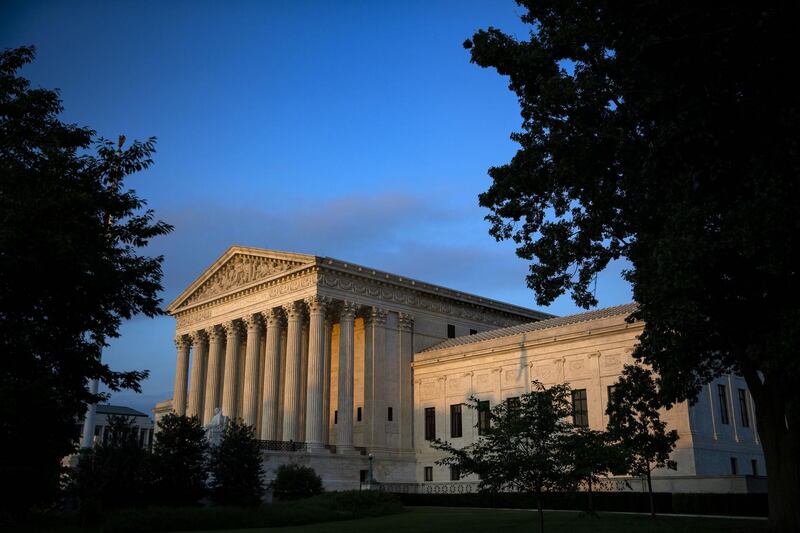US lawmakers drew battle lines Sunday ahead of a dramatic showdown over the fate of Donald Trump’s Supreme Court nominee, after a university professor who accuses the judge of sexual assault agreed to testify in the Senate.
Christine Blasey Ford, who accuses Brett Kavanaugh of attacking her at a high school party in the 1980s, reached a final deal to testify in an open hearing before a Senate committee on Thursday – although key details such as who will do the questioning remained unresolved.
“Despite actual threats to her safety and her life, Dr Ford believes it is important for senators to hear directly from her,” Ms Ford’s lawyers said in a statement quoted by US media.
Ms Ford had agreed on Saturday to the principle of testifying – after an increasingly ugly week-long standoff which saw her forced to move out of her California home in the face of death threats, as her credibility was openly attacked by the president.
_______________
Read more:
Kavanaugh, Ford agree to testify on Thursday
The Supreme Court controversy is testing the raison d'etre of Trump's presidency
Trump casts doubt on sexual assault claims against Kavanaugh
_______________
Mr Kavanaugh, who strongly denies the assault allegation, has said he wishes to testify as soon as possible to clear his name.
At stake is not only the fate of Mr Trump’s hand-picked Supreme Court nominee, but also Republican chances in November’s midterm elections, which risk being harmed if the polarising confirmation battle drags on.
Lindsey Graham – a member of the Senate Judiciary Committee which must approve Mr Kavanaugh’s nomination before it goes to the full chamber – summed up the position of many Republicans Sunday, saying he did not expect Ms Ford’s testimony to change his mind.
“What am I supposed to do? Go ahead and ruin this guy’s life based on an accusation?” he told Fox News Sunday. “Unless there’s something more, no I’m not going to ruin Judge Kavanaugh’s life over this.”
While Republicans are pushing to get the judge approved as soon as possible, Democrats have supported Ford’s call for an FBI investigation into her allegations – a move that would potentially provide additional information, but which would also delay the proceedings.
“What Dr Ford has asked for I think is a credible request: an investigation by the FBI,” Senator Dick Durbin, a Democratic member of the Judiciary Committee, said on ABC’s This Week.
“I think her requests have been reasonable,” he said.
According to a YouGov poll conducted for CBS, more than half of Americans think a vote on Mr Kavanaugh should wait for an FBI investigation, but over two-thirds of Republicans want one to happen in a matter of days.
Republicans, who hold a paper-thin majority in the Senate, can ill afford defections if Mr Kavanaugh is to be approved.
“If one Republican senator should decide that Dr Ford’s allegations, assertions, are true, and that they are serious, it could make a big difference in the nomination of Brett Kavanaugh,” Mr Durbin said.
After days of relative restraint, Mr Trump lashed at Ms Ford on Friday, questioning the credibility of her allegations, and in doing so may already have hurt his nominee’s chances with a senator from his own party.
Mr Trump contended that the fact Ford remained silent until now shows the incident probably was not “as bad as she says” – even if this runs counter to what experts say is the typical reaction of sexual assault victims afraid or embarrassed to report.
Susan Collins – a Republican who sits on the Judiciary Committee – said she was “appalled” by Mr Trump’s tweet, pointing out that incidents of sexual assault were known to be chronically under-reported.
Mr Trump’s outburst saw an outpouring of sympathy for Ms Ford – and outrage at the president – as thousands of women, and men too, shared why they had kept silent after being assaulted, under the Twitter hashtag #WhyIDidntReport.
Republican lawmakers are well aware they will be navigating a minefield during Ms Ford’s testimony, where they risk further alienating women voters if they are seen as too harsh towards her – and potentially triggering a backlash at the ballot box come November.
Ms Ford had initially guarded her anonymity but decided to waive it, she told The Washington Post, because she felt her “civic responsibility” was “outweighing my anguish and terror about retaliation,” after the basic outlines of the story emerged in the media.
Ms Ford’s husband, Russell Ford, was quoted by the Post on Saturday as saying the thought Mr Kavanaugh could be considered for the Supreme Court after Mr Trump took office troubled her so much that she considered moving as far away as New Zealand.
“She was like, ‘I can’t deal with this’,” Russell Ford said. “‘I cannot live in this country if he’s in the Supreme Court’.”






